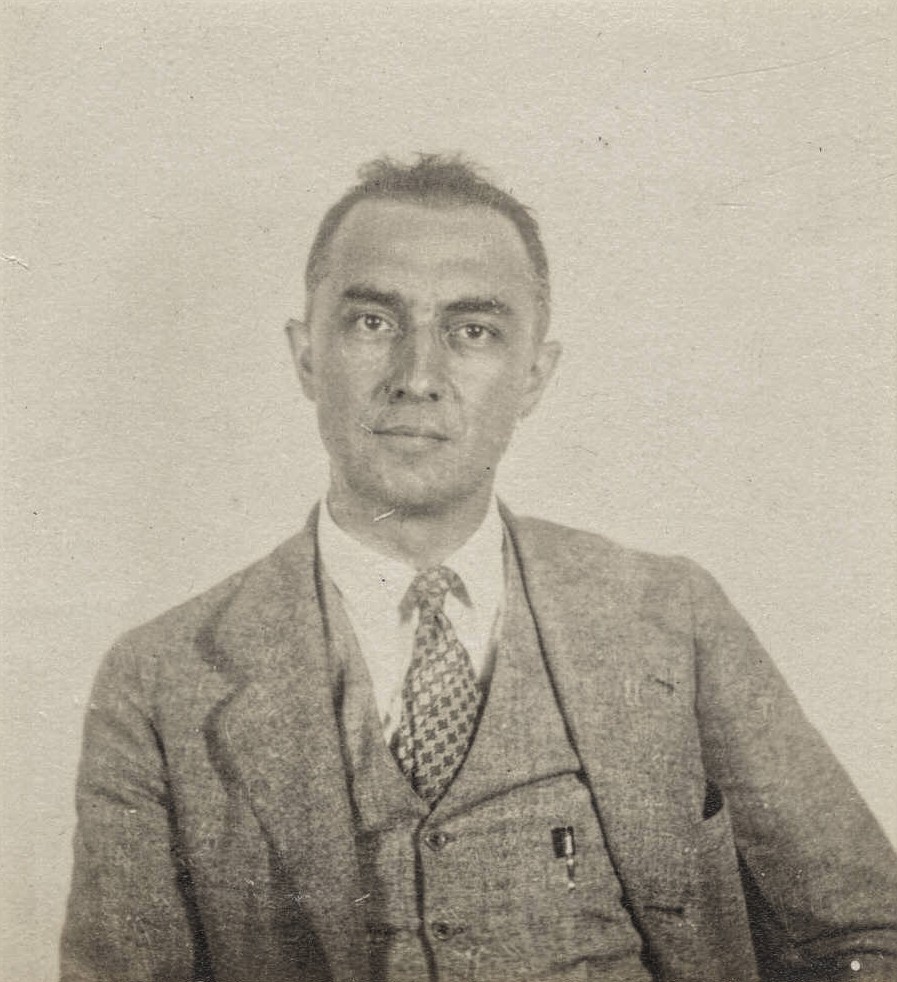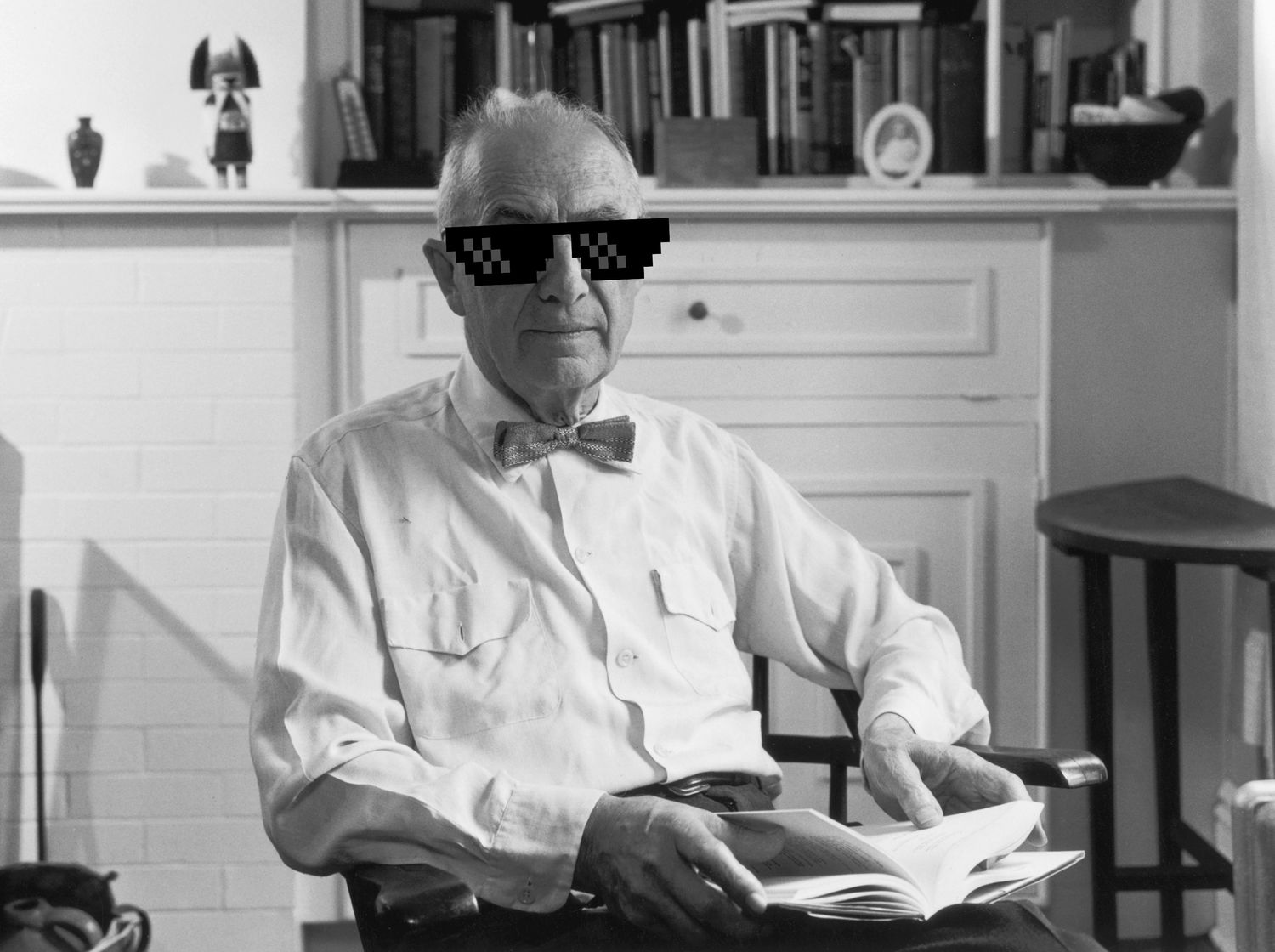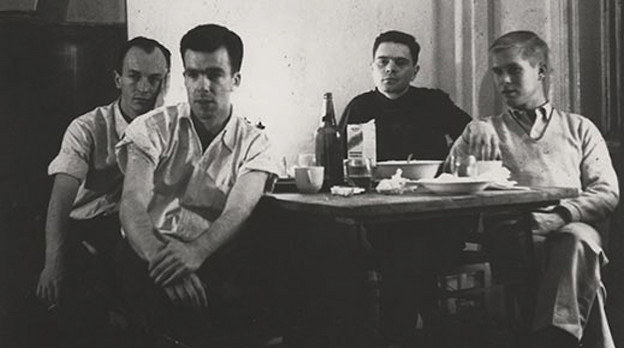El miércoles 14 de octubre en la Universidad Diego Portales me tocó presentar a Bruno Montané, poeta chileno y fundador del Infrarrealismo junto a Mario Santiago y Roberto Bolaño, quien participó de la Cátedra Abierta Roberto Bolaño con la conferencia “Papeles del afuerino”, he aquí el audio de ese día junto a algunas fotos de Roberto Apablaza.
Bloc de notas y archivo de columnas, traducciones, poemas y escritos varios de Rodrigo Olavarría
26 octubre, 2015
20 octubre, 2015
Cinco poemas de William Carlos Williams

BUENAS NOCHES
Bajo la luz brillante del gas
abro la llave del lavaplatos
y veo el agua salpicar
la blanca y limpia cerámica.
A un lado de
las ranuras del escurridero
un vaso lleno de perejil—
de un verde nítido.
Esperando
que el agua se enfríe—
echo una mirada al suelo impecable—:
un par de sandalias de goma
una al lado de la otra
bajo la mesa de pared
todo está en orden para la noche.
Esperando, con un vaso en la mano
—tres chicas vestidas de raso rojo
pasan cerca de mí en
el susurrante fondo de
la abarrotada ópera—
es
la memoria y sus payasadas—
tres difusas e insignificantes chicas
colmadas de aromas y
el murmullo de telas
que se frotan con telas y
pequeñas zapatillas en la alfombra—
¡francés de instituto
hablado en voz alta!
Perejil en un vaso,
inmóvil y resplandeciente,
me hace regresar.
Tomo un sorbo y
bostezo deliciosamente.
Estoy listo para acostarme.
JUEVES
He tenido mi sueño—como otros—
y nada en él se ha cumplido, de modo que
ahora descanso sin preocupaciones
con los pies bien plantados en el suelo
y miro al cielo—
sintiendo mi ropa a mi alrededor,
el peso de mi cuerpo en mis zapatos,
el borde de mi sombrero, el aire que pasa dentro y fuera
hacia mi nariz—y decido no soñar más.
TARDE PARA EL CLIMA VERANIEGO
Tiene puesto
un viejo sombrero gris claro
Ella una boina negra
Él un suéter sucio
Ella un abrigo viejo azul
que le queda ajustado
Pantalones grises anchos
Falda roja y
zapatos de tacón rotos
Gordo Perdido Paseando
por ningún sitio en particular
por el barrio alto van pateando
y hacen un camino a través
de montones de
hojas de arce en el suelo
todavía verdes—y
nítidas como billetes de un dólar
Nada qué hacer. ¡Opa!
RETRATO PROLETARIO
Una joven alta sin sombrero
con delantal
Su pelo peinado hacia atrás, parada
en la calle
Un pie con medias roza
la acera
Su zapato en la mano. Mirándolo
con atención
Ella saca la plantilla de papel
para encontrar el clavo
Que le ha estado haciendo daño
LA JOVEN ESPOSA
A las diez AM la joven esposa
se pasea en negligé tras
las paredes de la casa de su marido.
Yo paso solo en mi auto.
Luego ella baja a la vereda
a llamar al heladero, al pescadero y se queda,
tímida, sin corsé, acomodándose
algunos cabellos; y yo la comparo
con una hoja caída.
Las silenciosas ruedas de mi auto
pasan crepitando sobre
hojas secas mientras saludo y sonrío.
*
GOOD NIGHT
In brilliant gas light
I turn the kitchen spigot
and watch the water splash
into the clean white sink.
On the grooved drain—board
to one side is
a glass filled with parsley—
crisped green.
Waiting
for the water to freshen—
I glance at the spotless floor—:
a pair of rubber sandals
lie side by side
under the wall—table
all is in order for the night.
Waiting, with a glass in my hand
— three girls in crimson satin
pass close before me on
the murmurous background of
the crowded opera—
It is,
memory playing the clown—
three vague, meaningless girls
full of smells and
the rustling sound of
cloth rubbing on cloth and
little slippers on carpet—
high school French
spoken in a loud voice!
Parsley in a glass,
still and shining,
brings me back. I take my drink
and yawn deliciously.
I am ready for bed.
THURSDAY
I have had my dream — like others —
and it has come to nothing, so that
I remain now carelessly
with feet planted on the ground
and look up at the sky —
feeling my clothes about me,
the weight of my body in my shoes,
the rim of my hat, air passing in and out
at my nose — and decide to dream no more.
LATE FOR SUMMER WEATHER
He has on
an old light grey Fedora
She a black beret
He a dirty sweater
She an old blue coat
that fits her tight
Grey flapping pants
Red skirt and
broken down black pumps
Fat Lost Ambling
nowhere through
the upper town they kick
their way through
heaps of
fallen maple leaves
still green—and
crisp as dollar bills
Nothing to do. Hot cha!
PROLETARIAN PORTRAIT
A big young bareheaded woman
in an apron
Her hair slicked back standing
on the street
One stockinged foot toeing
the sidewalk
Her shoe in her hand. Looking
intently into it
She pulls out the paper insole
to find the nail
That has been hurting her
THE YOUNG HOUSEWIFE
At ten AM the young housewife
moves about in negligee behind
the wooden walls of her husband’s house.
I pass solitary in my car.
Then again she comes to the curb
to call the ice-man, fish-man, and stands
shy, uncorseted, tucking in
stray ends of hair, and I compare her
to a fallen leaf.
The noiseless wheels of my car
rush with a crackling sound over
dried leaves as I bow and pass smiling.

A big young bareheaded woman
in an apron
Her hair slicked back standing
on the street
One stockinged foot toeing
the sidewalk
Her shoe in her hand. Looking
intently into it
She pulls out the paper insole
to find the nail
That has been hurting her
THE YOUNG HOUSEWIFE
At ten AM the young housewife
moves about in negligee behind
the wooden walls of her husband’s house.
I pass solitary in my car.
Then again she comes to the curb
to call the ice-man, fish-man, and stands
shy, uncorseted, tucking in
stray ends of hair, and I compare her
to a fallen leaf.
The noiseless wheels of my car
rush with a crackling sound over
dried leaves as I bow and pass smiling.
02 octubre, 2015
'Baudelaire' de Delmore Schwartz

Este poema fue tomado del libro Selected Poems: Summer Knowledge, publicado por New Directions en 1967.
Baudelaire
Cuando me quedo dormido e incluso durante el
sueño,
Escucho, muy claramente, voces que hablan
Frases enteras, trivialidades y lugares comunes
Sin ninguna relación con mis asuntos.
Querida Madre, ¿nos queda tiempo
Para ser felices? Mis deudas son inmensas.
Mi cuenta bancaria está sujeta al juicio de la
corte.
No sé nada. No puedo saber nada.
He perdido la capacidad de esforzarme.
Pero hoy como antes mi amor por ti crece.
Siempre estás armada para apedrearme, siempre:
Es cierto. Desde mi infancia.
Por primera vez en mi larga vida
Estoy casi feliz. El libro, casi terminado,
Casi me parece bueno. Permanecerá, un monumento
A mis obsesiones, mi odio, mi asco.
Deudas e inquietudes persisten y me debilitan.
Satanás planea sobre mí, dulcemente susurrando:
"¡Descansa por un día! Hoy puedes descansar y
jugar.
Mañana vas a trabajar". Cuando llega la
noche,
Mi mente aterrorizada por las deudas,
Aburrida por la tristeza, paralizada por la
impotencia,
Promete: "Mañana: Lo haré mañana".
Mañana se repetirá la misma comedia
Con el mismo final, la misma debilidad.
Estoy cansado de esta vida de habitaciones
amobladas.
Estoy cansado de mis resfríos y mis jaquecas:
Tú conoces mi extraña vida. Cada día trae consigo
Una cuota de ira. Sabes poco
De la vida de un poeta, querida Madre: Debo
escribir poemas,
La más cansadora de las ocupaciones.
Estoy triste esta mañana. No me retes.
Te escribo desde un café cerca del correo,
Entre los ruidos de las bolas de billar y los
platos,
El golpeteo de mi corazón. Me pidieron que escriba
"Una historia de la Caricatura". Me
pidieron que escriba
"Una Historia de la Escultura".
¿Escribiré la historia
De las caricaturas de las esculturas de ti en mi
corazón?
Aunque sea para ti una agonía incalculable,
Aunque creas que no es necesario
Y dudes de la precisión de la suma, por favor,
Mándame dinero suficiente para por lo menos tres
semanas.
***
Baudelaire
When
I fall asleep, and even during sleep,
I
hear, quite distinctly, voices speaking
Whole
phrases, commonplace and trivial,
Having
no relation to my affairs.
Dear
Mother, is any time left to us
In
which to be happy? My debts are immense.
My
bank account is subject to the court’s judgment.
I
know nothing. I cannot know anything.
I
have lost the ability to make an effort.
But
now as before my love for you increases.
You
are always armed to stone me, always:
It
is true. It dates from childhood.
For
the first time in my long life
I
am almost happy. The book, almost finished,
Almost
seems good. It will endure, a monument
To
my obsessions, my hatred, my disgust.
Debts
and inquietude persist and weaken me.
Satan
glides before me, saying sweetly:
“Rest
for a day! You can rest and play today.
Tonight
you will work.” When night comes,
My
mind, terrified by the arrears,
Bored
by sadness, paralyzed by impotence,
Promises:
“Tomorrow: I will tomorrow.”
Tomorrow
the same comedy enacts itself
With
the same resolution, the same weakness.
I
am sick of this life of furnished rooms.
I
am sick of having colds and headaches:
You
know my strange life. Every day brings
Its
quota of wrath. You little know
A
poet’s life, dear Mother: I must write poems,
The
most fatiguing of occupations.
I
am sad this morning. Do not reproach me.
I
write from a café near the post office,
Amid
the click of billiard balls, the clatter of dishes,
The
pounding of my heart. I have been asked to write
“A
History of Caricature.” I have been asked to write
“A
History of Sculpture.” Shall I write a history
Of
the caricatures of the sculptures of you in my heart?
Although
it costs you countless agony,
Although
you cannot believe it necessary,
And
doubt that the sum is accurate,
Please
send me money enough for at least three weeks.01 octubre, 2015
Dos poemas de James Schuyler

En la foto Frank O'Hara, John Button, James Schuyler y Joe LeSueur, 1960.
Aquí un par de poemas de James Schuyler y una entrevista en su residencia final, el Chelsea Hotel. Acá un ensayo de Charles North sobre el verso de Schuyler. Y aquí un enlace para descargar en PDF el poema que le valió el premio Pulitzer, The Morning of the Poem.
POEMA
¿Qué tal ser una hoja de roble
si tuvieras que ser una hoja?
Imagina que pudieras vivir tu vida de nuevo
sabiendo lo que ya sabes
Imagina que tienes un montón de dinero
“Aléjate de mí, idiota insignificante”.
Cae la noche a principios de marzo,
eres como el olor del desagüe
de un restorán donde el paté de la casa
es una lonja de frío asado alemán
húmedo e indefinido. Te falta encanto.
*
FEBRERO
Una chimenea, respira una pequeña humareda.
El sol, a quien no logro ver
como hace un poco de rosado
no puedo ver bien en el azul.
El rosado en cinco tulipanes
a las cinco PM el día antes del primero de marzo.
El verde del tallo y las hojas del tulipán
como algo que no puedo recordar,
como encontrar una cebolla del pantano
lejos y hace mucho tiempo.
Porque entonces era diciembre
y el sol caía sobre el mar
cerca de los templos que fuimos a visitar.
Una ola verde se agitaba en el mar violeta
como el edificio de la ONU en bellos atardeceres,
verde y húmeda
mientras el cielo se ponía violeta.
Algunos almendros
Tenían algunas flores, como copos de nieve
salidos de la nada rosados a causa de la luz.
Un silencio gris
en el cual los caminos subían por la segunda avenida
hacia el cielo. Apenas
iban a remontar la colina.
Las hojas verdes de los tulipanes en mi escritorio
como la luz del pasto sobre la carne
y una campanario verde de cobre
y rayos de las luces que empezaban a brillar.
No logro sobreponerme
a como todo parece funcionar en conjunto
como una mujer que recién se asomó a su ventana
y se queda parada llenándola
con su hijo en los brazos.
Pareciera estar tan lejos. ¿Acaso es la luz
la que hace ver tan rosada a la guagua?
Puedo ver sus pequeños puños
y el agitarse de las tetas de la madre.
Está cada vez más gris y dorado y frío.
Dos leones del tamaño de perros enfrentados
en las puntas de una techumbre.
Es el polvo amarillo dentro de los tulipanes.
Es la forma de los tulipanes.
Es el agua en el vaso donde están los tulipanes.
Es un día como cualquier otro.
*
POEM
How about an oak leaf
if you had to be a leaf?
Suppose you had your life to live over
knowing what you know?
Suppose you had plenty of money
“Get away from me you little fool.”
Evening of a day in early March,
you are like the smell of drains
in a restaurant where paté maison
is a slab of cold meat loaf
damp and wooly. You lack charm.
FEBRUARY
A chimney, breathing a little smoke.
The sun, I can’t see
making a bit of pink
I can’t quite see in the blue.
The pink of five tulips
at five p.m. on the day before March first.
The green of the tulip stems and leaves
like something I can’t remember,
finding a jack-in-the-pulpit
a long time ago and far away.
Why it was December then
and the sun was on the sea
by the temples we’d gone to see.
One green wave moved in the violet sea
like the UN Building on big evenings,
green and wet
while the sky turns violet.
A few almond trees
had a few flowers, like a few snowflakes
out of the blue looking pink in the light.
A gray hush
in which the boxy trucks roll up Second Avenue
into the sky. They’re just
going over the hill.
The green leaves of the tulips on my desk
like grass light on flesh,
and a green-copper steeple
and streaks of cloud beginning to glow.
I can’t get over
how it all works in together
like a woman who just came to her window
and stands there filling it
jogging her baby in her arms.
She’s so far off. Is it the light
that makes the baby pink?
I can see the little fists
and the rocking-horse motion of her breasts.
It’s getting grayer and gold and chilly.
Two dog-size lions face each other
at the corners of a roof.
It’s the yellow dust inside the tulips.
It’s the shape of a tulip.
It’s the water in the drinking glass the tulips are in.
It’s a day like any other.
Suscribirse a:
Comentarios (Atom)